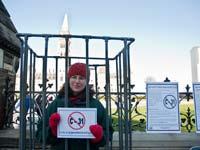Canada’s ‘betrayal’ triggers protests, lawsuit

Protests have erupted globally against Canada’s moves to close visa offices and eliminate a massive backlog of 280,000 immigration applications under the Federal Skilled Worker Program created before 2008.
The Government of Canada asserts that the Federal Skilled Worker Program is undergoing a process of “transformation”. But for some 280,000 affected applicants, Canada’s decision to eliminate the program’s backlog is a betrayal.
Rallies and protests in front of Canadian diplomatic missions have erupted in the United Kingdom, India, Pakistan, Hong Kong and Iran among other places at the new proposed law, which the Conservatives hope to pass this summer.
Meanwhile, a group of lawyers are working feverishly to stop the law with a class action suit saying the move is unfair because people have been waiting to come to Canada for years.
The government announced its decision to wipe out the application backlog in its March budget, saying it is a necessary part of modernizing the country’s immigration system.
The Harper government is also making other changes to Canada’s refugee system.
Lorne Waldman, an immigration lawyer based in Toronto, said the new law that breaks a promise to applicants who followed all the necessary steps to come to Canada.
“They’ve been waiting in the queue for years and years, and now [Immigration Minister] Jason Kenney is saying, ‘Yeah we told you to wait in the queue, we told you that was the right way but that’s too bad. Now we’ve changed our mind and there’s no longer going to be a queue for you.’
“I think that’s immoral,” he said in an interview aired by CBC news.
Along with several other lawyers, Waldman is seeking class-action certification for a lawsuit, which now has about 40 litigants from China and Hong Kong, that would challenge the decision to eliminate the backlog and force the government to process applications.
In Hong Kong last week, dozens of protestors gathered at a rally denouncing the changes and handed over letters to Canadian diplomats. About 12,000 of the impacted applicants are from mainland China or Hong Kong. The government has set aside $130-million to refund application fees and says applicants are free to try again under the new criteria.
“We applied to immigrate to Canada because we believed that Canada is governed by the rule of law and treats everyone equally. Sadly, your conduct reveals an alternative, sinister side of Canada, one mirroring the same attitude toward the people [we]in autocracies are used to suffering,” read a letter that was addressed to Kenney and signed “Chinese victims of FSW” (the initials of the Federal Skilled Workers program).
In Punjab, India where Canada has always been a favoured destination, Indian media sai there are thousands of people of people who had been in the waiting queue list to seek visa for Canada since 2004.
One of them is Baljit Singh from Jalandhar who has been waiting in line for over 10 years.
“I had been harbouring dreams of migrating to Canada for years. He said that the new immigration policy of Canada has led to great deal of frustration,” he said.
The affected families in Punjab by Canada’s new immigration policy have decided to approach the federal government in New Delhi to intervene in the matter. The families also held a rally at Jantar Mantar in New Delhi on June 4.
Ottawa has responded to its critics saying the proposed changes in Canada’s immigration rules are aimed at attracting more skilled tradespersons to the country, to fill the growing labour shortages being faced by sectors such as natural resources and construction.
The government said that the new laws would streamline the immigration policy with economic needs of Canada; provide companies which hire immigrants will a direct responsibility to assess the education, skills and credentials of immigrants directly and allows applicants get a better idea about their employability when they land in Canada.
Leave a comment









